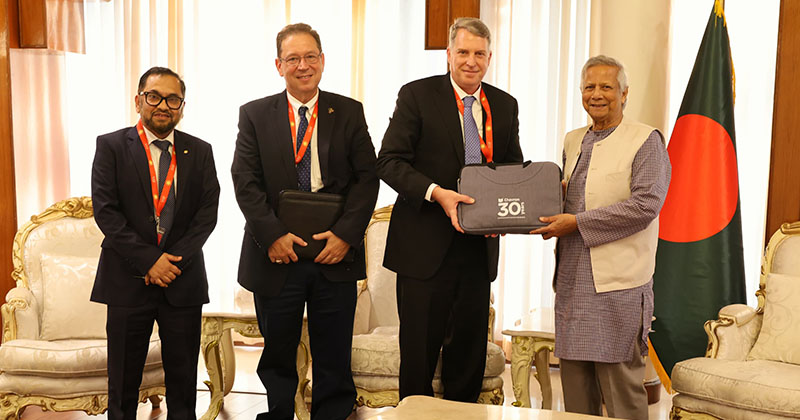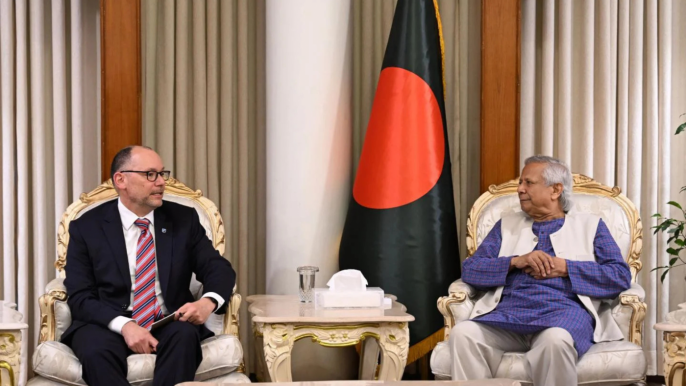US multinational company Chevron has suspended a promised investment to expand gas production when domestic gas production continues to decline, and the import of higher-priced liquefied natural gas (LNG) has increased.
While keeping the investment on hold, the company exerted pressure and recovered its invoice in full. Furthermore, without commencing work, Chevron has also collected interest on delayed payments, amounting to penalties.

According to Bangladesh Oil, Gas and Mineral Corporation (Petrobangla) sources, under contractual obligations, gas bills must be paid within 30 days of submission. Failure to do so incurs penalties. This time, penalties exceeding $30 million (equivalent to Tk366 crore at Tk122 per dollar) have been paid.
Petrobangla officials stated that Chevron produces gas from three fields (Bibiyana, Moulvibazar, and Jalalabad). On average, their monthly bills amount to approximately $40 million. During the tenure of the previous government, when dollar shortages led to delayed payments, Chevron began applying pressure.
How State Department, US Embassy triggered violence during July uprising
Why has Yunus aide Debapriya censured non-disclosure agreement in US tariff talks?
Critical review of the U.S.-Bangladesh agreement on reciprocal trade
In August 2024, some $240 million remained outstanding. To recover the dues, Chevron halted new investments, thereby creating additional pressure. Having conducted business in Bangladesh for three decades and received various benefits over time, such behaviour has been deemed unexpected, Petrobangla officials said.
How Chevron blackmails
The government is undertaking successive programmes of well repairs, development, and drilling to increase gas production. However, production is also declining in Chevron-operated fields.
To boost output in the Jalalabad gas field in Sylhet, Chevron was scheduled to install a compressor, with completion expected by December this year. The company had even extended the project’s contractual term. Nonetheless, citing the prevailing political situation, Chevron has been delaying investment by various means.
It was reported that on April 4, last year, Chevron wrote to Petrobangla stating that, until the invoice was fully settled, investment in the Jalalabad compressor project would be deferred.
After the interim Government assumed office, steps were taken to clear arrears in the power and energy sector. On April 17, Chevron’s outstanding dues were fully paid. Subsequently, on April 20, Petrobangla issued a letter to Chevron, noting that upon completion of the project, Chevron had earlier indicated that an additional 352 billion cubic feet of gas could be produced from Jalalabad.
Failure to complete the project on schedule, however, would result in a significant decline in production. This would undermine the principal purpose of extending the contractual term for the Jalalabad gas field. As all outstanding payments have now been cleared, Petrobangla expressed the expectation that Chevron will promptly commence work at Jalalabad.
According to Petrobangla sources, two months after Petrobangla’s letter, Chevron issued another condition in a letter dated June 22. Alongside the regular bill payments, the company demanded that Petrobangla pay the penalties for delayed bill settlements by September 30.
Petrobangla cleared the entire penalty amount ahead of schedule, on August 29. On August 31, Petrobangla once again wrote to Chevron, urging the company to commence work promptly in order to realise the benefits of the Jalalabad project.
A responsible Petrobangla official stated that once work begins, it may take up to two years to complete the project.
Is it ethical?
Chevron Bangladesh was asked in writing how ethical it was to exert pressure in this way to recover arrears and penalties.
In response, Sheikh Zahidur Rahman, Media and Communications Manager of Chevron, told Prothom Alo that regular discussions were ongoing with the government to explore opportunities. However, he added that, as a matter of long-term policy, Chevron Bangladesh does not disclose its specific commercial plans.
Reserves have slightly increased in two of the three gas fields operated by Chevron. At Bibiyana, recoverable reserves have now been assessed at 7.66 TCF, with current reserves standing at just 1.25 TCF, enough for approximately four more years of production.
In Moulvibazar, reserves amount to around 20 billion cubic feet (BCF). Daily production is 16 million cubic feet, equating to roughly four years of supply. At Jalalabad, reserves stand at less than 700 BCF, with daily production of 128 million cubic feet. At this rate, production can continue for approximately one and a half years.
Mohammad Saiful Islam, Secretary of the Energy and Mineral Resources Division, told Prothom Alo that, now that all arrears have been cleared, Chevron is expected to commence work at Jalalabad as a priority project.
Geologist Badrul Imam, speaking to Prothom Alo, commented that multinational companies operating in any country for an extended period must take political fluctuations into account. However, exerting pressure in this manner to extract payment is an act of arrogance. He emphasised that such conduct is neither rational nor ethical. He further stated that Petrobangla should now apply pressure to compel Chevron to begin work without delay.
More LNG from spot market
On September 9, the committee on public purchase approved a proposal to purchase two cargoes of LNG to meet the growing demand in the country. Finance Adviser Dr. Salehuddin Ahmed presided over the meeting.
As per the proposal of the Energy and Mineral Resources Department, Petrobangla will purchase one cargo of LNG from M/S Aramco Trading Singapore Pte Ltd of Singapore for Tk497.91 crore through the international quotation method.
Based on another proposal, Petrobangla will purchase another cargo of LNG from M/S Ganbar Singapore Pte Ltd of Singapore for Tk502.95 crore through the international quotation method.
In addition, consultancy services will be obtained from Norway’s Carbon Limits AS for the project titled “Technical Assistance for Carbon Reduction in the Oil and Gas Value Chain,” for Tk50.52 crore.
LNG from Excelerate Energy
The Yunus regime has signed a long-term agreement with US firm Excelerate Energy to import LNG worth Tk1 lakh crore in 15 years to reduce its tariff deficit.
Peter D. Haas, the former US ambassador in Dhaka who played a key role in toppling the Awami League government, is now working as a strategic adviser to Excelerate Energy.

Haas arrived in Bangladesh earlier this month and visited the company’s floating LNG terminal and an under-construction hospital in Maheshkhali, Cox’s Bazar. On September 3, he met Foreign Secretary Asad Alam Siam to discuss increasing LNG supplies to Bangladesh.
The agreement was confirmed by Engineer Md. Shah Alam, General Manager (LNG Division) of Transformed Natural Gas Company Limited (RPGCL). He said: “The government has emphasised importing LNG to reduce the country’s gas crisis. As part of this, a long-term agreement has been signed with this American company.”
The agreement was signed under special provisions during the previous Awami League government on November 23, 2023. Although the Yunus regime cancelled several special agreements, this agreement has been maintained under the excuse that there was no scope for cancellation due to legal obligations.